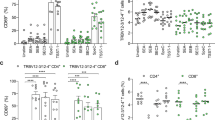Abstract.
Immune response against a foreign antigen is characterized by a growth phase, in which antigen-specific T cells clonally expand, followed by a decline phase in which the activated T cells undergo apoptosis, a process termed activation-induced cell death (AICD). In the current study, we have investigated the phase at which 2,3,7,8-tetrachlorodibenzo-p-dioxin (TCDD) acts to downregulate the antigen-specific T cell response. To this end, C57BL/6 +/+ mice were injected with staphylococcal enterotoxin A (SEA) into the footpads (10 µg/footpad), and simultaneously treated with TCDD (10 or 50 µg/kg intraperitoneally). At various time points, the draining lymph node (LN) cells were analyzed for SEA-activated T cells. The data demonstrated that in C57BL/6 +/+ mice, TCDD treatment did not alter the growth phase but facilitated the decline phase of SEA-reactive T cells. TCDD caused a significant decrease in the percentage and absolute numbers of CD4+ and CD8+ SEA-responsive T cells expressing Vβ3+ and Vβ11+ but did not affect SEA-nonresponsive Vβ8+ T cells. Upon in vitro culture, TCDD-exposed SEA-immunized LN cells exhibited increased levels of apoptosis when compared with the vehicle controls. When Fas-deficient (C57BL/6 lpr/lpr) or Fas ligand defective (C57BL/6 gld/gld) mice were treated with TCDD, they failed to exhibit a decrease in percentage and cellularity of SEA-reactive T cells, thereby suggesting a role of Fas-Fas ligand interactions in the TCDD-induced downregulation of SEA-reactive T cell response. The resistance to TCDD-induced decrease in T cell responsiveness to SEA seen in Fas- and FasL-mutant mice was neither due to decreased aryl hydrocabon receptor (AhR) expression nor to altered T cell responsiveness to SEA. The current study demonstrates that TCDD does not prevent T cell activation, but prematurely induces Fas-based AICD, which may contribute to the deletion of antigen-primed T cells.
Similar content being viewed by others
Author information
Authors and Affiliations
Additional information
Electronic Publication
Rights and permissions
About this article
Cite this article
Camacho, I.A., Nagarkatti, M. & Nagarkatti, P.S. 2,3,7,8-Tetrachlorodibenzo-p-dioxin (TCDD) induces Fas-dependent activation-induced cell death in superantigen-primed T cells. Arch Toxicol 76, 570–580 (2002). https://doi.org/10.1007/s00204-002-0390-2
Received:
Accepted:
Issue Date:
DOI: https://doi.org/10.1007/s00204-002-0390-2




